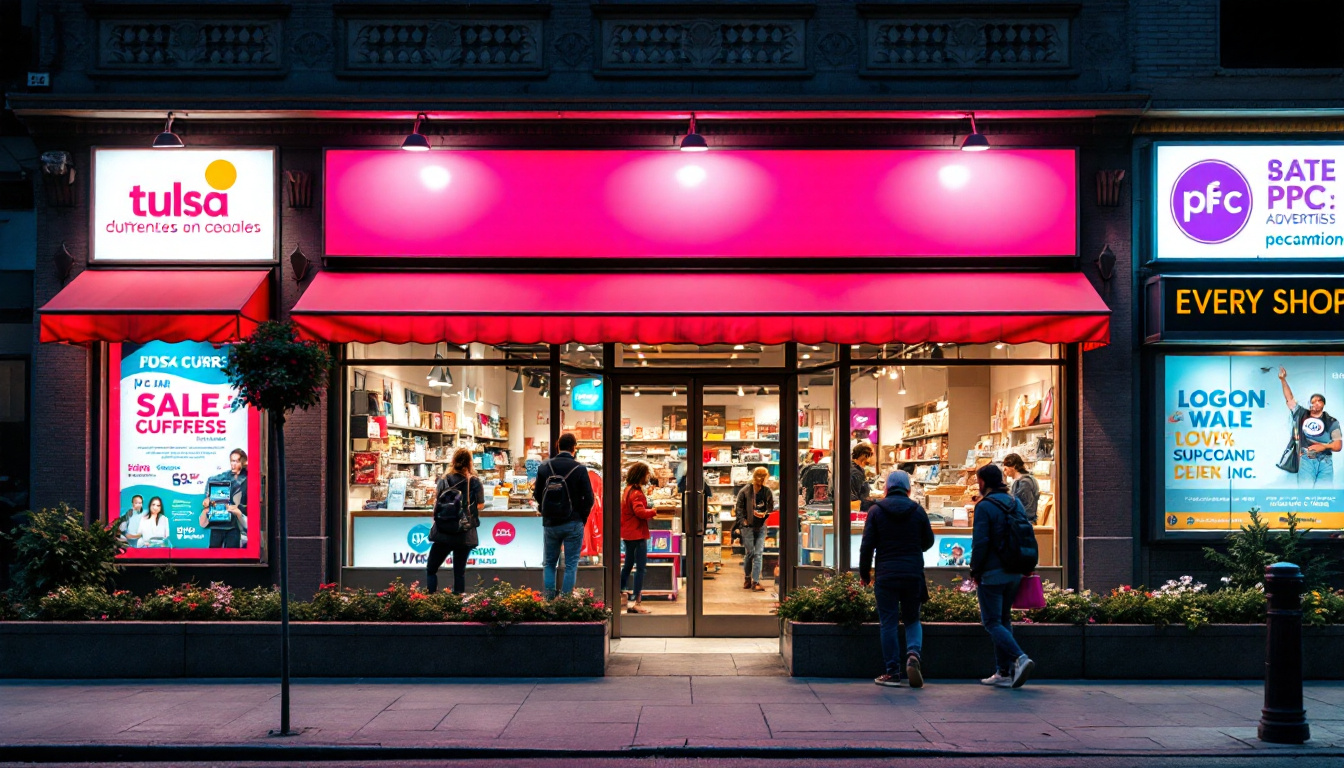What Tulsa, OK Businesses Should Know About Google Ads Updates

In the ever-evolving world of digital marketing, staying updated with the latest changes in platforms like Google Ads is crucial for businesses looking to gain a competitive edge. For Tulsa, OK businesses, understanding these updates can significantly influence their online advertising strategies. With that in mind, let’s delve into what every local business should know regarding recent Google Ads updates.
Understanding the latest Google Ads updates
The landscape of Google Ads is continuously changing, with updates rolled out regularly to enhance user experience and optimize ad performance. Recently, Google has introduced several significant enhancements aimed at improving targeting capabilities, ad formats, and overall campaign efficiency. Businesses should pay close attention to these updates, as they can dramatically affect advertisement reach and effectiveness.
A particularly important update from Google is the implementation of new machine learning algorithms that help improve ad targeting. These algorithms analyze user behavior and preferences to suggest ads that are more relevant, ultimately increasing conversion rates. Additionally, Google has increasingly emphasized the importance of first-party data, encouraging businesses to collect and utilize their data for more effective ad targeting. This shift towards leveraging first-party data is crucial, especially in an era where privacy regulations are tightening and third-party cookies are being phased out. By focusing on first-party data, businesses can build more meaningful relationships with their customers and tailor their advertising strategies to meet specific needs and preferences.
Key Features of the Latest Updates
Among the key features introduced in the recent updates are:
- Performance Max Campaigns: This new campaign type allows advertisers to access all Google Ads inventory from a single campaign, effectively simplifying ad management.
- Enhanced Conversion Tracking: Improved tracking features help businesses to better understand the customer journey and optimize their conversion strategies.
- Ad Customization: Dynamic ad features have been upgraded, allowing for more personalized ad experiences.
Furthermore, Google has introduced advanced audience targeting options that allow advertisers to reach specific segments based on detailed demographics, interests, and online behaviors. This feature not only enhances the precision of ad delivery but also enables businesses to craft messages that resonate more deeply with their target audience. Additionally, the integration of video ads into Performance Max campaigns has opened new avenues for creativity, allowing brands to engage users through compelling visual storytelling across various platforms, including YouTube and Display networks. As these updates continue to roll out, staying informed and agile will be key for businesses looking to maximize their advertising potential and navigate the evolving digital landscape effectively.
How updates impact your PPC strategy
For many Tulsa businesses, pay-per-click (PPC) advertising is a vital element of their marketing strategies. Understanding how these new updates affect your PPC initiatives is essential. The recent changes often lead to discussions around budget allocation, target audience definition, and ad performance measurement.

With updates like Performance Max, businesses can broaden their reach but may also need to take a more strategic approach to manage their budget. This often means re-evaluating how funds are allocated across different ad formats and platforms. As automation takes a front seat in PPC campaigns, it might lead businesses to reconsider traditional targeting methods. Moreover, the integration of machine learning algorithms in PPC tools allows for more precise audience segmentation, enabling advertisers to reach potential customers who are more likely to convert. This shift not only enhances the efficiency of ad spend but also encourages businesses to stay agile and responsive to changing market dynamics.
Revising Your PPC Plan
Your PPC strategy should reflect these updates to ensure continued success. Consider implementing the following practices:
- Monitor performance metrics closely to assess how updates affect campaign outcomes.
- Experiment with new ad formats to discover which resonates best with your audience.
- Adapt your keyword strategy based on the latest targeting capabilities.
In addition to these practices, it's crucial to stay informed about industry trends and competitor strategies. Regularly reviewing competitor PPC campaigns can provide valuable insights into what works and what doesn’t in your niche. Furthermore, leveraging A/B testing can help refine your messaging and visuals, ensuring that your ads not only capture attention but also drive engagement. By continuously optimizing your PPC efforts in response to updates and market shifts, you can maintain a competitive edge and maximize your return on investment.
Adapting campaigns to new Google features
Adapting your Google Ads campaigns to leverage new features is imperative in maximizing ROI. Tulsa businesses should take immediate action to incorporate these advances into their advertising practices. This may involve restructuring campaigns, introducing new ad creatives, or altering bids based on performance insights provided by Google’s updates. Staying ahead of the curve not only helps in maintaining competitiveness but also ensures that marketing budgets are utilized efficiently, leading to better overall results.
For instance, when utilizing Performance Max campaigns, businesses can input their desired outcomes, and Google will optimize ad placements across various platforms, including Search, YouTube, and Display Networks. This multifaceted approach offers an opportunity to maximally leverage Google's advertising capabilities. By employing machine learning algorithms, Google can analyze vast amounts of data to determine the best-performing ads and placements, thus enhancing the likelihood of reaching the target audience effectively.
Steps to Adapt Your Campaigns
To effectively adapt your campaigns, consider the following strategies:
- Conduct audience research to understand how changes may affect customer engagement.
- Update your ad creatives to employ the latest features such as automated ad generation and responsive search ads.
- Regularly review and adjust your campaign strategies based on performance data and industry benchmarks.
Additionally, it is crucial to keep an eye on emerging trends in digital marketing, as these can significantly influence how consumers interact with ads. For example, the rise of video content has made platforms like YouTube a vital component of any advertising strategy. By integrating video ads into your campaigns, you can engage users more effectively and convey your brand message in a dynamic way. Furthermore, consider utilizing Google's audience targeting options, which allow you to reach specific demographics, interests, and behaviors, ensuring your ads resonate with the right people.
Moreover, testing and experimentation should be at the forefront of your campaign adaptation strategy. A/B testing different ad formats, messaging, and calls to action can provide valuable insights into what resonates best with your audience. This iterative process not only helps in refining your campaigns but also fosters a culture of continuous improvement within your marketing team. Embracing these new features and strategies will ultimately position Tulsa businesses to thrive in an increasingly competitive digital landscape.
The role of automation in modern PPC campaigns
Automation is reshaping the way businesses conduct PPC campaigns. With artificial intelligence and machine learning at the heart of Google Ads updates, advertisers in Tulsa can streamline their processes and improve ad effectiveness. Automation not only optimizes bid adjustments but also personalizes ad delivery. This means that ads can be tailored to specific user preferences and behaviors, leading to a more engaging experience for potential customers. As a result, businesses can expect higher click-through rates and conversion rates, which are crucial for maximizing their return on investment.

For businesses managing multiple campaigns or ad groups, automation tools can help reduce the workload while maximizing results. Utilizing automated bidding strategies based on target CPA (Cost Per Acquisition) or ROAS (Return on Ad Spend) allows for more dynamic ad management and optimization. These strategies can adapt in real-time to changes in market conditions or user behavior, ensuring that advertising budgets are spent effectively. Furthermore, automation can facilitate A/B testing of ad creatives and landing pages, allowing marketers to quickly identify the most effective combinations without the need for constant manual oversight.
Benefits of Automation
Implementing automation can yield numerous benefits, including:
- Increased Efficiency: Frees up time to focus on strategy over manual tasks.
- Improved Targeting: Uses advanced algorithms to target the right audiences based on behavior.
- Better Performance Insights: Automates data analysis, providing clear insights into campaign success.
Moreover, automation enhances the ability to scale campaigns effectively. As businesses grow, their advertising needs become more complex, often requiring the management of numerous campaigns across various platforms. Automation tools can handle this complexity by allowing for bulk changes, automated reporting, and performance tracking across multiple channels. This scalability not only saves time but also ensures that businesses can maintain a consistent presence in the digital marketplace, adapting their strategies as needed without overwhelming their marketing teams.
Another significant advantage of automation is its capacity for continuous learning. The algorithms used in automated systems learn from past performance data, enabling them to make increasingly informed decisions over time. This means that as more data is collected, the system becomes better at predicting which strategies will yield the best results. By leveraging this ongoing learning process, businesses can stay ahead of their competitors and respond proactively to changes in consumer behavior or market trends, ensuring that their PPC campaigns remain relevant and effective.
Key takeaways from recent Google Ads changes
As we wrap up our discussion, here are the key takeaways that Tulsa businesses should remember regarding the latest Google Ads updates:
- Stay informed about updates and how they can impact your advertising strategies.
- Regularly review and adjust your PPC strategies to reflect new features.
- Utilize automation tools to enhance efficiency and optimize campaign performance.
By embracing these changes and adapting marketing strategies accordingly, Tulsa businesses can enhance their advertising effectiveness, reach more customers, and drive higher conversions. Keeping up with Google Ads updates isn't just a good practice; it’s an essential part of thriving in today’s digital marketplace.

As a Google Ads expert, I bring proven expertise in optimizing advertising campaigns to maximize ROI.
I specialize in sharing advanced strategies and targeted tips to refine Google Ads campaign management.
Committed to staying ahead of the latest trends and algorithms, I ensure that my clients receive cutting-edge solutions.
My passion for digital marketing and my ability to interpret data for strategic insights enable me to offer high-level consulting that aims to exceed expectations.





























